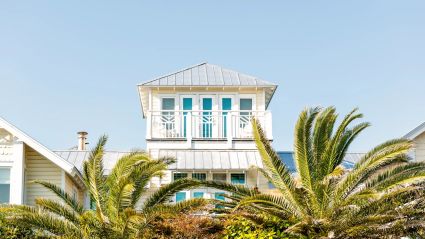1. Understand the beach house market
In 2023, the luxury modern beach house market was valued at $13.4 billion and is expected to increase to $22.9 billion by 2030. However, the beach house market can vary significantly depending on location.
Financing options to buy a beach house
Financing a second home by the sea can differ slightly from financing a primary residence. Traditional mortgage options are still available, but you might encounter stricter requirements or higher interest rates. For example, conventional loans for vacation homes often require a higher down payment (usually 20%-30%) compared to primary residences. These loans may have different qualification requirements and might come with adjustable interest rates (ARMs) that start low but can fluctuate over time.For those who don't require full-time ownership, co-ownership presents an intriguing financing option. Pacaso, for instance, offers a model where multiple people co-own a luxury beach house at destinations like:Co-ownership allows you to enjoy the benefits of beach living without the full financial burden and responsibility of sole ownership.| Expert quote: ”Co-owning with friends or family offers a solution to lower that barrier and provides a hack for the current affordability crisis sweeping the nation.”— Austin Allison, CEO of PacasoSource: The Pacaso co-ownership growth report |
2. Find the best beach house location
While the allure of beachfront living is undeniable, location goes beyond just proximity to the water. Consider the following when searching for the best place to buy a beach house:- Distance from your primary residence: The occasional trip might be manageable for a nearby romantic weekend getaway, but weekly commutes could become a burden.
- Walkability score: Living somewhere with a high walkability score means you can ditch the car and explore the neighborhood on foot.
- Climate: Consider if you want warm weather year-round or a seasonal escape with crisp autumns and colorful foliage.
- Ambiance: Seek the solitude of a secluded beach with minimal development or embrace the lively energy of a bustling beach town.
- Activities: Decide if relaxing with your family or enjoying a trendy atmosphere is more of a priority.
3. Evaluate the long-term value of a house near the beach
Beyond the initial purchase, consider the long-term value proposition of your beach house. Owning beachfront property can be a fantastic investment or second home, but aligning with your goals is essential.By carefully evaluating the following points, you can ensure your beach house becomes a tailor-made space that fulfills your coastal living dreams:- Ownership goals: Consider whether you see this as your permanent residence, a vacation getaway you'll use occasionally or a rental property.
- Long-term usability: Think about the size and layout of the house and if it will comfortably fit your needs now and in the future.
- Property age and condition: Assess the house's condition, considering age and potential repairs. Older beach homes may require renovations.
- Maintenance costs: Factor in the costs of maintaining a beach house due to salt air and sand exposure. This may include routine pressure washing.
- Potential resale value: Consider the property's resale value in the future.
4. Complete inspections and due diligence
Before finalizing any purchase, thorough inspections and due diligence are crucial to avoid unwelcome vacation home mistakes. Inspections by qualified professionals can uncover hidden costs that might not be readily apparent. These could range from structural issues due to age and wear to potential problems with plumbing or electrical systems exposed to the harsh beach environment. For example, research flood zones and storm risks in your chosen location because, while beachfront property offers stunning views, beach living might also be more susceptible to flooding or storm damage. Standard homeowners insurance typically doesn't cover flood damage, so factor in the cost of beach-specific flood insurance when calculating your second home budget. By taking these steps, you can move forward with confidence, knowing you're investing in a sound property with minimal hidden costs.Pros and cons of owning a beach house
Owning a beach house offers a unique lifestyle with undeniable advantages, but it also comes with challenges and considerations that go beyond the idyllic vacation picture.
Advantages of buying a beach house
Owning a beach house isn't just about proximity to the water. It unlocks a lifestyle brimming with advantages:- Convenience: The beach is in your backyard with this type of vacation home.
- Perspective: Beaches can be some of the most relaxing destinations, allowing you to gain a healthier perspective on life.
- Familiarity: You’ll likely see many of the same people, allowing you to develop a sense of belonging that could grow with every visit.
Disadvantages of buying a beach house
While the allure of beachfront living is undeniable, it's important to acknowledge the potential drawbacks before making a significant purchase. Here are some of the challenges that come with owning a beach house:- Cost: In many places, you could spend more on a beach house than you would for a house twice as big a few miles inland.
- Upkeep: Owning a second home brings its share of work, just like a primary home. Beachfront homes require even more attention due to salt damage.
- Insurance: It costs more to insure a home near the water due to the elements.
Things to consider when buying a beach house

- Implement financial planning: Set a realistic budget that encompasses not just the purchase price but also ongoing costs like maintenance, property taxes and insurance. Factor in potential renovations or upgrades you might desire down the line.
- Evaluate geological hazards: Research flood zones and erosion rates in your chosen area. A beachfront view might be tempting, but it could come with higher flood insurance premiums and long-term vulnerability to erosion.
- Schedule inspections: Schedule a thorough inspection by a qualified professional familiar with the specific challenges of beach houses.
- Consider HOA rules: If the property falls within a homeowners association (HOA), carefully review the association's rules and fees.
- Prepare for the salt: Install a sprinkler system to regularly wash away corrosive salt spray from the house's exterior. This can help minimize rust and extend the lifespan of your siding and other components.
- Manage moisture: Regularly maintain gutters and ventilation systems to prevent moisture build-up and potential mold growth.
- Protect against storms: Consider installing storm shutters or a hurricane protection system, especially if you live in an area prone to severe weather. They help lower insurance premiums.
- Meet local experts: Research and establish relationships with local contractors familiar with the specific maintenance needs of beach houses.
Co-own a beach home
Owning a beach house might seem out of reach due to the high cost of purchasing and maintaining a waterfront property. But what if you could enjoy the benefits of beach living without the sole financial responsibility? Co-ownership through a platform like Pacaso presents an innovative solution.Pacaso offers shared ownership of luxury beach homes, allowing you to experience the joys of beachfront living at a fraction of the cost of traditional ownership. Owning a Pacaso lets you spend quality time with loved ones at your beach getaway without the hassles of maintenance and management.Buying a beach house FAQ
01: How much money is a beach house?
The cost of a beach house varies greatly depending on location, size and features, but generally starts around $450,000. Loans for a second home often require a higher down payment, somewhere between 20 and 30%. You also must factor in expenses like closing costs, insurance, upkeep and maintenance. Co-ownership is a good alternative to conventional home ownership as it relieves some of the financial burden and hassles of maintenance and management.
02: How much is beachfront insurance?
Beachfront insurance can be significantly more expensive than standard homeowners insurance due to wind and flood risks. It also varies greatly depending on the region.
03: Should I buy a beach house as a primary residence or a vacation home?
Whether to buy a beach house as a primary residence or vacation home depends on your lifestyle and budget. Consider factors like commute time and potential rental income.
04: What are the tax implications of owning a rental beach house?
Owning a rental beach house can generate income but also comes with tax implications like reporting rental income and potential depreciation deductions. Consult a tax advisor for specific advice.
05: Is it cheaper to buy or build a beach house?
Typically, it’s less expensive to buy a beach house than it is to build it from the ground up. This is mostly due to high costs of land and construction expenses. To get the benefits of a new build, you may want to consider purchasing an old home and fixing it up or even tearing it down and building from scratch.
06: Is it worth buying a beach house?
Buying a beach house can be a fantastic investment. It not only offers the perfect backdrop for family vacations and relaxing getaways, but it can also provide financial benefits should you decide to rent it out when you are not using it.
07: Where is the cheapest place to buy beachfront property?
According to Realtor.com, Pascagoula, Mississippi is the most affordable location for beachfront property. Other affordable destinations include Atlantic City, New Jersey; Deerfield Beach, Florida; Sunset Beach, North Carolina and Newport, Oregon.










